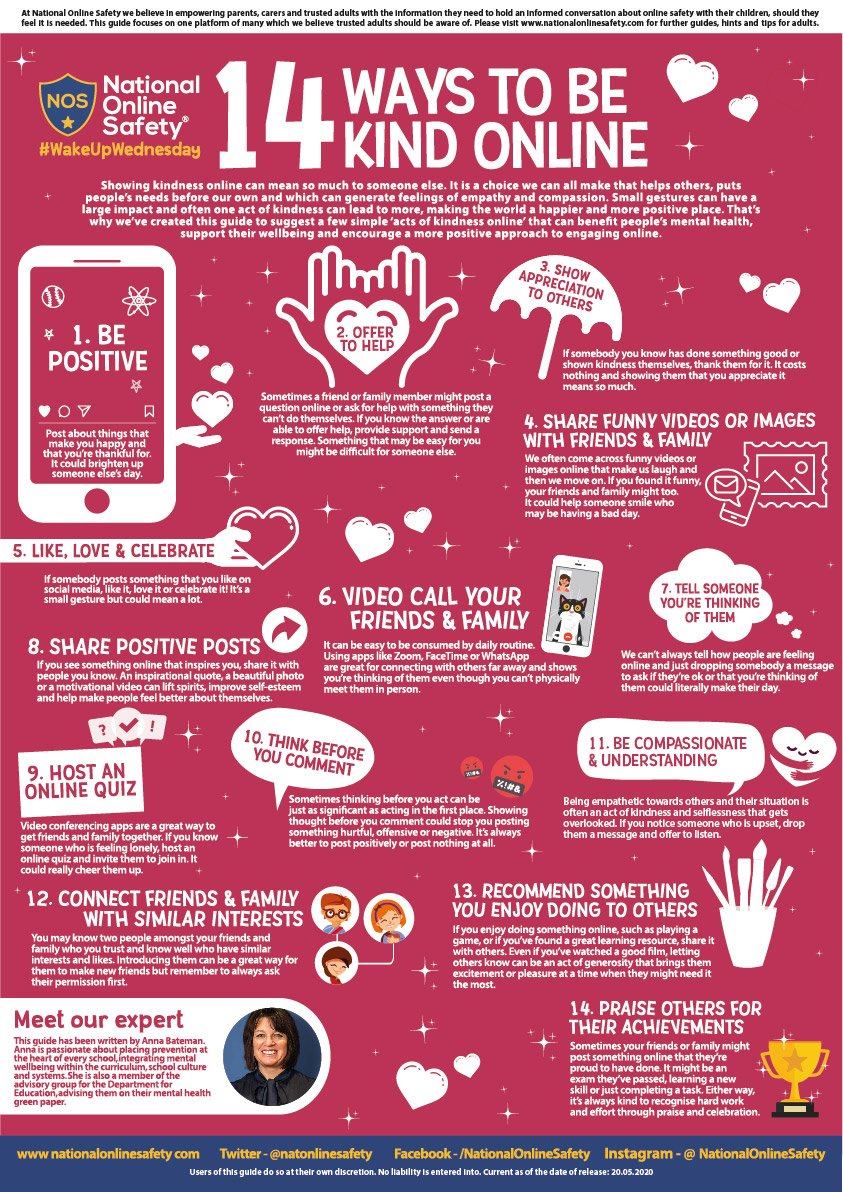- Don’t post any personal information online – like your address, email address or mobile number.
- Think carefully before posting pictures or videos of yourself. Once you’ve put a picture of yourself online most people can see it and may be able to download it, it’s not just yours anymore.
- Keep your privacy settings as high as possible
- Never give out your passwords
- Don’t befriend people you don’t know
- Don’t meet up with people you’ve met online. Speak to your parent or carer about people suggesting you do
- Remember that not everyone online is who they say they are
- Think carefully about what you say before you post something online
- Respect other people’s views, even if you don’t agree with someone else’s views doesn’t mean you need to be rude
- If you see something online that makes you feel uncomfortable, unsafe or worried: leave the website, turn off your computer if you want to and tell a trusted adult immediately
E-Safety
There are lots of fun and interesting things you can do on the Internet, and it can be a great way to stay in touch with friends. But it’s important to understand how to stay safe online. It’s not always easy to know what’s safe online and what’s not. Our advice can help you to keep safe and to know what to do when things go wrong.

S is for safe- Never give your personal information to people that you do not know.
M is for meet- Never arrange to meet with strangers.
A is for Accepting- Never accept emails or messages from people that you do not know as they
might contain a virus.
R is for reliable- Not everything that you read on the internet is true.
T is for tell- If anything upsets you on the internet always tell a trusted adult.
Top Ten Tips for Staying Safe Online
Top Tips for Searching
- Be clear in your online searches try to use more than one word to describe what you are searching for. For example, if you are searching for information on the planet Mercury, entering planet mercury into the search box will better results than just entering Mercury.)
- Take care to spell correctly when typing in a search. Even a small typing error can bring up unwanted results.
- Remember that not all the information in websites returned in searches is reliable. Look in books, ask people who might know, and look up at least three other websites to check your info.
- Make sure you filter your searches online especially if you are doing an image search.
- Bookmark your favourite websites or check your history to make sure you are revisiting the same websites.
- If you see something that upsets you, make sure you turn off the screen or make the window smaller on a laptop and tell an adult as soon as possible.
- There's a lot of information online and not all of it is for kids. You might be surprised to hear that some things online are illegal!
- Ask an adult to install Hector Protector - Visit the thinkuknow website and install Hector Protector so that when you are searching online you always have a friend with you.
Top Ten Tips for Mobile Phone Safety
- Remember if you are being bullied it isn’t your fault and there is nothing so awful that you can’t speak to someone about it. Talk to a trusted adult at home or at school.
- Don’t reply to any nasty messages you receive.
- Don’t reply to a text from someone you don’t know.
- Keep the messages you have been sent so you can show them to a trusted adult and make a note of the time and date of the messages or calls you receive.
- Don’t answer calls from withheld numbers or numbers you don’t recognise, let it go to voicemail.
- Block numbers from people who are sending you nasty messages.
- If you are bullied repeatedly can change your number.
- Don’t give your mobile number to someone you don’t know.
- Don’t send pictures to someone you don’t know.
- Tell your parents. If the problem is serious you can report it to the police, cyber mentors, or childline.
Top Ten Tips if your are being Bullied Online
- Tell an adult you trust if you are being cyberbullied
- Don’t respond or retaliate to bullying messages – it could make things worse
- Block users who send you nasty messages
- Save abusive emails or messages (or texts) you receive
- Make a note of dates and times you receive bullying messages, as well as details you have of the user’s ID and the url.
- Don’t pass on any cyberbullying videos or messages – this is cyberbullying
- If you are bullied repeatedly change your user ID, or profile, and use a name that doesn’t give any information away about you
- Visit bullying.co.uk – this is a website where trained counsellors can support you if you are being bullied, either by chatting online or by calling their free helpline. You can also find some top tips on how to stay safe – http://www.bullying.co.uk/
- You can talk to someone at Child Line or get online safety advice at http://www.childline.org.uk/talk/Pages/Talk.aspx
- http://www.thinkuknow.co.uk/ is another very useful website for children and young people staying safe online